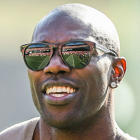Last we heard from Terrell Owens, he was trying to convince the struggling Eagles' offense to give him one last shot at NFL redemption.
Owens hasn't played in the league in six years, and he hasn't played in Philadelphia since the 2005 season, when injuries limited him to just seven games. But in 2004, his first year with the Eagles, T.O. was pretty much unstoppable. In 15 games, he had 77 receptions for 1,200 yards and 14 touchdowns. And even after then-Cowboys safety Roy Williams hobbled him with a legal-at-the-time horse-collar tackle in a Week 15 matchup that kept Owens out of the lineup for six weeks, he returned for the Super Bowl matchup against the Patriots.
In that game, T.O. caught nine passes for 122 yards, and almost willed the Eagles to the win. Of course, with Owens' prodigious on-field talents come all the other stuff, which would manifest itself in various ways, including driveway sit-ups and calling out teammates, even the franchise quarterback.
And it was that rocky relationship with Donovan McNabb that played a part in the Eagles' decision to move on from Owens after just two seasons.
On Thursday, T.O., appearing on 97.5 The Fanatic with former teammate Brian Westbrook, said that his popularity in Philly made McNabb jealous.
"I never had ill will against Donovan, but maybe he had something against me, " Owens said. "I think it was just the way the city embraced me as opposed to when he got drafted and they booed him, and things like that may have weighed on him. To be in that stadium, Lincoln Financial Field, and have 70,000 fans chant my name, 'T.O., T.O.,' maybe that got under his skin a little bit."
As for Owens' inglorious exit, he has an explanation for that too.
"I think everyone sees and knows that it really wasn't my fault," he said. "Donovan was their guy. I was pretty much the scapegoat."
That's one version of it. But the aforementioned driveway incident was a stunt for more money. And while it's certainly a player's right to ask for a raise, the manner in which he chooses to do it can, in the eyes of his employer, become more trouble than it's worth. There's also this: Owens had a history of wearing out his welcome. There's a reason a Hall of Fame talent played for five teams in his 16 NFL seasons.
This isn't the first time we've heard Owens talk about the McNabb dynamic. In February 2014, he echoed many of the same sentiments above.
"Well, the thing is, I think a lot of people don't really know -- how things played out everybody is going to blame me and now I'm the scapegoat for me not being there and some of the things that played out," Owens told 94WIP's Angelo Cataldi at the time. "I knew at heart what was going on, kind of behind the scenes. I've talked to friends, I've talked to players, I've talked to coaches that really knew what happened and what transpired during my time there. My thing is, I had nothing but respect and love for Donovan."
It sounds like the feeling is mutual, even if Owens' version of events doesn't reflect that. In February, McNabb made the case that T.O. deserves to be a Hall of Famer.
"The thing about Terrell is, on the field, outstanding talent," McNabb told CBS Sports Radio's "Tiki and Tierney Show" at the time. "Probably one of the best receivers that I played with in the pro ranks. He's one of the best to have ever done it, and will he be a Hall of Famer? Absolutely."
McNabb also didn't deny that Owens had built a following, both with the city and in the locker room.
"Andy (Reid) was a very disciplined guy," McNabb explained. "He wanted things structured ... but people (began) to follow Terrell, and Terrell knew that. Terrell had these guys (thinking) this is the way to do it, when, no, that's not how we did it in Philly. We're going to do it the way it's supposed to be done. People felt some type of way on Terrell's side, just like (some) people (were) on my side."
To recap: What remains undeniable was Owens' otherworldly on-field talents.
"T.O. gave us that extra oomph that we needed on offense to become that passing attack that would be more of a problem for defensive coordinators to try to stop," McNabb said.

















